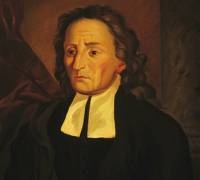Divine Providence and Human Providence in the New Science
Posted on October 19, 2012 by Jennifer
Giambattista Vico’s New Science is, in part, “a rational civil theology of divine providence” (NS 385). It is a rational civil theology because it seeks to interpret the poetic theology conceived by the theological poets, and because it understands the theology of the poets as a civil history unto itself, recording the acts of men under the guise of deities. Still, as Vico indicates, the Science is balanced on divine providence, the definition of which is seemingly unclear throughout the text. Using Vico’s descriptions of divine providence from the text, this essay will show that providence, though it appears to exist on a higher plane of existence from human beings, exists within all humans and expresses itself in the creation of religions and societies throughout history. It will also expose an apparent anomaly in Vico’s conception of divine providence, and how this anomaly ultimately aligns with the overall message of the New Science.
Vico describes divine providence as having “omnipotence as minister… infinite wisdom as counselor… [and] immeasurable goodness” (343). As minister, it introduces institutions according to the natural order of men. The natural order also arises through providence, which lends man a nature of potentiality for improvement (310). As a counselor of infinite wisdom, anything it imparts on men “must, in its entirety, be [institutive] order” (343). Because providence is immeasurably good for its divine purposes, any institution is directed toward a good that is higher than that of any human institution (343). Given these three attributes, a question arises regarding the nature of divine providence: is providence an outside force that can insert itself into human existence and prescribe the best possible institution based on the natural order of a people, or is it in fact an innate sense within all humans? That is, do humans already possess a natural sense of social order and goodness?
Vico attributes divine providence for the founding of human societies and religion. In his natural state, man is prone to three vices: ferocity, avarice, and ambition, which, under the guidance of providence, are transformed into strength, riches and wisdom (132). Here he calls providence a “divine legislative mind,” through which social order evolves organically (133). His wording here, the use of the word “mind,” contributes to the hypothesis that men are essentially the true source of providence. The mind, being the unseen organ of humans, is combined with the divine, the unseen realm of God. Further supporting this claim is the ancient tendency to credit gods for human achievements. Regarding government, “providence ordered these institutions of men, concerning which they said truly, though in a false sense, that they were all the work of the gods” (630). With the understanding that the “work of the gods” is actually the work of the ancient men, Vico shows that ancient humans, not understanding the nature of the world, attributed their achievements to the gods. Given the right direction, the basic human vices can converge to create the basis for community.
Further expanding on the human-centered aspect of providence, Vico shows that religious societies were the first to arise, and they arose because the gentiles, ignorant to the full natural order of the world, believed the gods to be the creators of all that was unexplained (629). The religious society flows directly from the poetic aspect of the earliest cultures. Vico says, “The early gentile peoples, by a demonstrated necessity of nature, were poets who spoke in poetic characters” (NS 34). The poetic characters are imaginative, and the deeds of gods they speak of are as real as the deeds of men that we recognize today. The earliest societies existed in the “age of gods,” thus named because the “gentiles believed they lived under divine governments” (31). As human knowledge developed, two other governments arose: that of heroes, who existed on the threshold of the human and the divine, and that of men, which developed when all men “recognized themselves as equal in human nature” (31). It is providence that drove this evolution, the natural progression of history that arose from accumulating knowledge and reflection.
There is a great irony to Vico’s idea of divine providence, which is exposed when we consider the very mistake the ancients made in their ignorance: falsely believing that their institutions, ordered by their own providence, were actually the works of the gods. While Vico provides evidence showing that divine providence is innately human, we cannot avoid the fact that it seems to be, by its name, innately divine as well. In order to understand the irony, we must again consider human nature. Man has vices, but he also has the free will to direct his natural inclinations to a higher purpose, with the help of God (132, 136). Thus begins, from the singular man, the basis for all social and political systems, which is balanced upon the idea that God, through divine providence, was the prime mover for man’s social evolution. And so it appears that Vico, by crediting God for the initial “push” that incited history, is guilty of the same false belief of ancient men that the gods were responsible for their progress. Given that Vico is such a careful writer, it is unlikely that he was unaware of this small quirk in his Science. He brings the progression of humanity from the age of gods to the age of men full circle, illustrating the fact that, whether an idea is presented in myth or in scientific fact, there is a human spirit that is constant throughout history.
Jennifer. “Divine Providence and Human Providence in the New Science.” 10/19/2012. <http://modernity.blog.sbc.edu/2012/10/19/divine-providence-and-human-providence-in-the-new-science/>.
